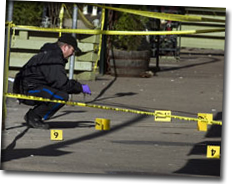 Love CSI? Become a forensic scientist!
Love CSI? Become a forensic scientist!
OK, it’s not all crashing about at crime scenes and using the latest in computerised analytical technology in the lab, but becoming a forensic scientist does place you in the front line for fighting all kinds of crime. Also known as crime scene investigators or forensic science technicians, this good career is seriously useful to society as a whole. The focus is on examining various types of trace material found at crimes by investigating police officers, analysing their contents and attempting to use the evidence provided to link suspects with the crime scene, the victim or the weapon used. Based on the principle that every contact leaves a trace, the comparatively recent discovery of DNA and the establishment of a national database has revolutionised this profession.

Techniques involved include microscopy, infra-red spectroscopy, genetic fingerprinting, electron microscopy, with analysing samples a major task. Examining crime scenes, sifting miniscule quantities of evidence, researching new procedures, giving evidence in court, presenting and justifying findings, liaising with police and prosecutors and supervising trainees and assistants are all essential parts of this demanding but fascinating career.
Strong communications skills, both written and verbal, close attention to the tiniest detail, computer and relevant software expertise and meticulous analytical skills are all essential. Some of the work, especially at crime scenes, may be stressful and distressing, giving the ability to deal with your own negative feelings a distinct advantage in this job. Entry requirements are high, including relevant degree subjects such as mathematical and applied sciences, medical science, engineering, chemistry, biochemistry, pharmacology, physiology, biology and bio-medical science. Applicants with honours degrees and/or Masters’ degrees will be given preference at interview level, with accredited university courses also increasing the chance of acceptance. Competition in the field is intense, with a PhD or MSc in forensic science getting you at least short-listed for an interview – the rest is up to you!
Initial in-house training now takes up to 18 months before you are allowed to deal with your own cases without supervision, with accelerated career development possible for the talented in this field. From this point, the fastest way to advance is to develop a specific specialisation such as DNA analysis. External courses run by affiliated organisations can be of use in moving upwards as well as in cross-specialisation. Entry-level salaries for trainees are relatively modest at around $30,000 (£18,000), but may be boosted considerably by Masters’ degrees in a related subject. After training and two years’ experience, expect around $45,000 (£30,000), with typical senior-level pay at around $75,00 (£50,000) or more.

